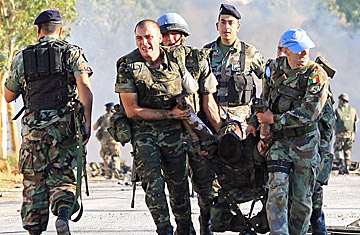
Spanish U.N. soldiers carry the body of a colleague killed by a roadside bomb in southern Lebanon, June 24, 2007
A suspected suicide car bomber killed six Spanish United Nations troops in south Lebanon Sunday, signalling what could be the launch of a campaign to drive the 13,500-strong force out of Lebanon. There was no immediate claim for the deadly bombing, the first such attack against the U.N. force, known as UNIFIL, since the end of the month-long war between Israel and Lebanon's militant Shi'ite Hizballah organization last summer. But UNIFIL has been bracing for just such an attack after months of intelligence warnings and threats from al-Qaeda leaders and Lebanon-based groups inspired by Osama bin Laden.
The early evening bombing occurred along a narrow road between the southern Lebanese towns of Khiam and Marjayoun, four miles north of the border with Israel. An armored vehicle carrying Spanish UNIFIL troops was struck by a suicide car bomb that blasted the vehicle off the road and set it on fire. Six soldiers died in the blast and two others were wounded, according to UNIFIL. Near the UNIFIL vehicle was the twisted wreckage of a civilian car containing human remains. An initial report that the explosion was caused by a powerful roadside bomb was later discounted in favor of the suicide car bomber. "We are working on the theory of a terrorist attack," said Spanish Defense Minister Jose Antonio Alonso. "In the last few weeks there have been many incidents which have destabilized Lebanon."
The bomb attack was one of the worst experienced by UNIFIL in its 29-year presence in south Lebanon, but Milos Strugar, UNIFIL's senior advisor, told TIME that the peacekeepers "remain fully committed to the mission." Hizballah, which has cordial relations with UNIFIL, swiftly condemned the attack, saying it "hurts the people of the south and of Lebanon."
The Lebanese government is struggling to check a steadily worsening security climate. In the past month alone, Lebanon has witnessed fierce battles in the north between the Lebanese army and the al-Qaeda-inspired militants of Fatah al-Islam, the assassination of an anti-Syrian politician, and a spate of bomb attacks targeting tourist areas, ruining Lebanon's economically crucial summer tourist season before it had even begun. A week ago, militants fired two Katyusha rockets into Israel from south Lebanon, the first such incident since last summer.
Many Lebanese see the hand of Syria behind the instability presently racking Lebanon. A U.N. investigation has implicated senior Syrian officials in the 2005 murder of Rafik Hariri, a former Lebanese prime minister. Although the investigation is still under way, an international tribunal was established by the U.N. Security Council earlier this month to judge Hariri's killers once indictments are issued. Syria has strenuously denied any involvement in Hariri's death and says it will not cooperate with the tribunal, which it regards as a political tool to pressure Damascus into complying with Washington's demands.
Still, anti-Syrian Lebanese believe that Damascus is stirring the current violence to force the Western-backed Lebanese government to abandon its support for the tribunal. UNIFIL officials have been concerned for months that the peacekeepers could become caught up in Lebanon's instability, with the chief threat coming from al-Qaeda. Ayman al-Zawahiri, deputy to Osama bin Laden, has twice referred to UNIFIL in recent months. In February, he described the peacekeepers as "international crusader forces" and urged his "brothers in Islam and Jihad in Lebanon" to attack them. Arrested militants of Fatah al-Islam, which includes jihadist veterans of the Iraq insurgency and is suspected of ties to Syrian military intelligence, have reportedly confessed to planning attacks against UNIFIL.
"We have to take all these threats seriously, but it does not affect the way we operate or our ability to fulfill our mandate," UNIFIL'S Strugar told TIME in an interview last week at the U.N. group's headquarters in the southern coastal village of Naqoura.
Analysts suspect that the rocket attack last week and the deadly suicide bombing threatens to revive the traditionally volatile Lebanon-Israel border as a theater of conflict. UNIFIL's leading troop contributing nations are France, Italy and Spain. The three powerful European countries agreed last summer to provide the military backbone to a beefed up UNIFIL. But that resolve will likely wane fast if their soldiers find themselves under regular attack in south Lebanon.
And UNIFIL officers privately admit that they are relatively vulnerable against determined assailants, despite increased security measures around their observation posts and hill top bases in south Lebanon. Sources told TIME that the UNIFIL headquarters regularly receives unspecified intelligence warnings of possible impending attacks, such as bomb-laden cars entering the southern Lebanon border district. "The problem is that there's nothing hard enough for us to act upon," a UNIFIL officer told TIME a day before Sunday's fatal bombing. "We are a soft target and it's only a matter of time before we are hit." Immediately after Sunday's bombing, UNIFIL raised its alert status from "amber" to "red" in readiness for what could be a hot summer in south Lebanon.
